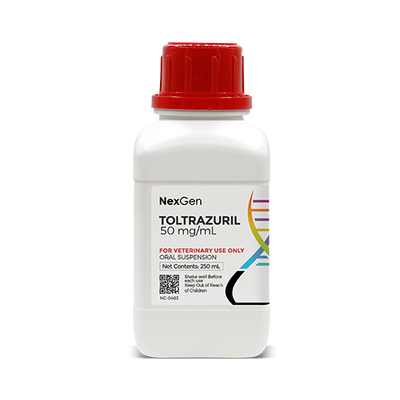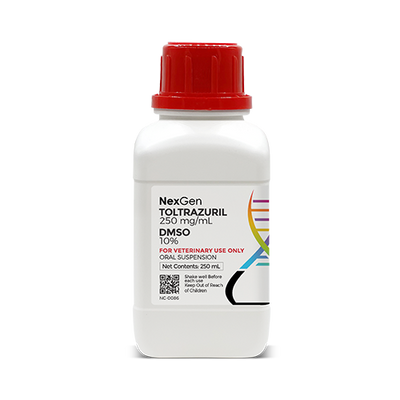
Clear Cough (Ammonium Chloride + Potassium Iodide + Guaifenesin), Oral Suspension, (250mL)
Login for pricing
- Brand
- Mixlab
- SKU:
- NC-0015
- Product Type:
- Suspension
- Size:
- 250ml
- Administration:
- Oral
Clear Cough
As with humans and other mammals, coughing can simply indicate the presence of a transient mechanical or environmental irritant in the respiratory tract, or it can be the sign of clinical illness. When a horse coughs, people take notice, since it is typically a loud, dramatic, whole-body proposition that is impossible to ignore—particularly if a person happens to be mounted on the horse at the time.1
Unfortunately, the dramatic nature of equine coughs is not a reliable indicator of how serious a horse’s cough may be, even when transient, innocuous causes have been ruled out. Coughing does cause discomfort in horses and, as with humans, the longer coughing persists, the more uncomfortable each cough becomes. When acute, coughing may make a horse lethargic and intolerant to activity. If not promptly addressed, coughing can increasingly impede a horse’s ability to perform or cause irreversible chronic damage to the respiratory tract. Early management is key in order to relieve this stress on the horse’s respiratory system.
Irritation or Illness?
It’s common for a horse to cough occasionally, or as the horse begins exercise. Coughing that persists throughout a ride or performance however, may indicate a respiratory infection or other more serious problems. A few of the more common illnesses and conditions that can cause horses to cough include:
• Pneumonia—This is an inflammation of the lungs, including the tissues of the lungs, as opposed to the air passages, which indicates bronchitis.
• Influenza—This is a highly-contagious, acute viral infection involving the respiratory tract.
• Aspiration Pneumonia—This type of pneumonia develops when foreign materials are drawn into the lungs.
• Inflammatory Airway Disease (IAD)—This is a less-understood condition that commonly occurs in young performance horses.
• Pleuropneumonia—A bacterial infection of the lungs, pleuropneumonia also affects the pleural lining between the lungs and the chest wall.
• Recurrent Airway Obstruction—This condition is also referred to as equine asthma or “heaves”. This more commonly occurs in mature horses, and is usually brought on by exposure to dust.
• Rhinopneumonitis—This is a highly contagious condition caused by one of two herpesviruses (EHV-1 or EHV-4). It is characterized by fever and respiratory symptoms.
• Strangles—This is an infection of the lymph nodes of the head and neck that is caused by the bacteria Streptococcus equi.
Some of these are obviously very serious conditions that will warrant the intervention of a veterinarian and comprehensive treatment, while others are conditions that can be managed with minimal intervention.
If a horse is listless, exhibits discharge from the nose or eyes, or begins to cough with little provocation, it is definitely time to address the issue. At this point, it is time to begin gathering information and eliminating possible causes. Obtaining a rectal temperature can quickly determine whether or not fever is present. Assessing the horse’s environment for potential irritants would be the next step. Is the hay being fed clean and dry, or has it been around long enough or in an environment that would give rise to mold? Are there ambient ammonia fumes in the barn or stable? Have adjacent areas become particularly dry and dusty due to the season or the increased activity of horses in the area? All of these can be considered or eliminated as possible culprits and should be addressed, since chronic mechanical irritation (dust, chemical irritants) can make the horse’s respiratory tract more susceptible to bacterial and viral attacks.
A nasal discharge, if present, can be an indicator of what may be plaguing the coughing horse. A clear, watery discharge might indicate a viral infection, while a whitish discharge may be related to an allergy or airway inflammation. Nasal discharges with color (creamy, yellow or green) are typically indicative of bacterial infection.
Prevention
Preventing the development of respiratory irritation and infection in horses is absolutely essential. Fresh air, good-quality hay and feed will eliminate several risk factors. Stabled horses’ straw should be clean and changed regularly. There are several bedding alternatives available for allergic or sensitive horses. It is also important to prevent horses breathing in ammonia from urine, as this is toxic and particularly harmful to the airways.
Clear Cough for Horses
Clear Cough by NexGen Pharmaceuticals is essential for the management of coughing in horses in cases where serious clinical illness is not present, and as an adjunctive treatment for the treatment of coughing due to respiratory ailments. It is important to consult your veterinarian before beginning any treatment regimen.
Active Ingredients
-
Guaifenesin 22 mg/mL
-
Ammonium Chloride 20 mg/mL
-
Potassium Iodide 20 mg/mL
Guaifenesin is a parenteral muscle relaxant and expectorant commonly used in performance horses to aid in the clearance of mucus from the airways. Guaifenesin is also a centrally acting skeletal muscle relaxant and as such is a prohibited drug with withdrawal necessary prior to competition.2
The Association of Racing Commissioners International Uniform Classification Guidelines for Foreign Substances has designated guaifenesin a CLASS 4 DRUG.
FOR RX ONLY: A valid prescription from a licensed veterinarian is required for dispensing this medication.
2Knych HK, Stanley SD, Benson D, Arthur RM. Pharmacokinetics of guaifenesin following administration of multiple doses to exercised Thoroughbred horses. J Vet Pharmacol Ther. 2016 Aug;39(4):416-9. doi: 10.1111/jvp.12287. Epub 2016 Jan 14. PMID: 26763117.




















